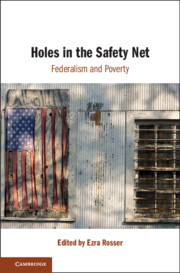Book contents
- Holes in the Safety Net
- Holes in the Safety Net
- Copyright page
- Dedication
- Contents
- Contributors
- Acknowledgments
- Introduction
- Part I Welfare and Federalism
- Part II States, Federalism, and Antipoverty Efforts
- 4 States’ Rights and State Wrongs
- 5 State and Local Tax Takeaways
- 6 Early Childhood Development and the Replication of Poverty
- 7 States Diverting Funds from the Poor
- 8 States’ Evolving Role in the Supplemental Nutritional Assistance Program
- Part III Advocacy
- Index
7 - States Diverting Funds from the Poor
from Part II - States, Federalism, and Antipoverty Efforts
Published online by Cambridge University Press: 05 September 2019
- Holes in the Safety Net
- Holes in the Safety Net
- Copyright page
- Dedication
- Contents
- Contributors
- Acknowledgments
- Introduction
- Part I Welfare and Federalism
- Part II States, Federalism, and Antipoverty Efforts
- 4 States’ Rights and State Wrongs
- 5 State and Local Tax Takeaways
- 6 Early Childhood Development and the Replication of Poverty
- 7 States Diverting Funds from the Poor
- 8 States’ Evolving Role in the Supplemental Nutritional Assistance Program
- Part III Advocacy
- Index
Summary
This chapter describes how states and their human service agencies team up with private companies to turn vulnerable populations into sources of revenue. Cash-strapped states have been unwilling to raise sufficient revenue through general taxation and are thus looking for money elsewhere, including schemes that are largely unknown to the public to divert federal aid and other funds from children and the poor. Foster care agencies take resources from children in their care, including Social Security disability and survivor benefits, Veteran’s Assistance benefits if their parents died in the military – and even child support. States use illusory budget shell games to siphon away billions in Medicaid funds intended for children and low-income adults. Juvenile courts maximize revenue by removing children from their homes. To illustrate the interconnections of a sampling of the practices, Anna is introduced, a hypothetical foster child who encounters and is impacted by the revenue strategies in different states. The chapter explains how the state practices are undermining the purpose of government and the intended benefits of fiscal federalism – and how a fundamental realignment is required so that states are true to their purpose, to exist not for themselves but for the good of the people.
Keywords
- Type
- Chapter
- Information
- Holes in the Safety NetFederalism and Poverty, pp. 151 - 172Publisher: Cambridge University PressPrint publication year: 2019



